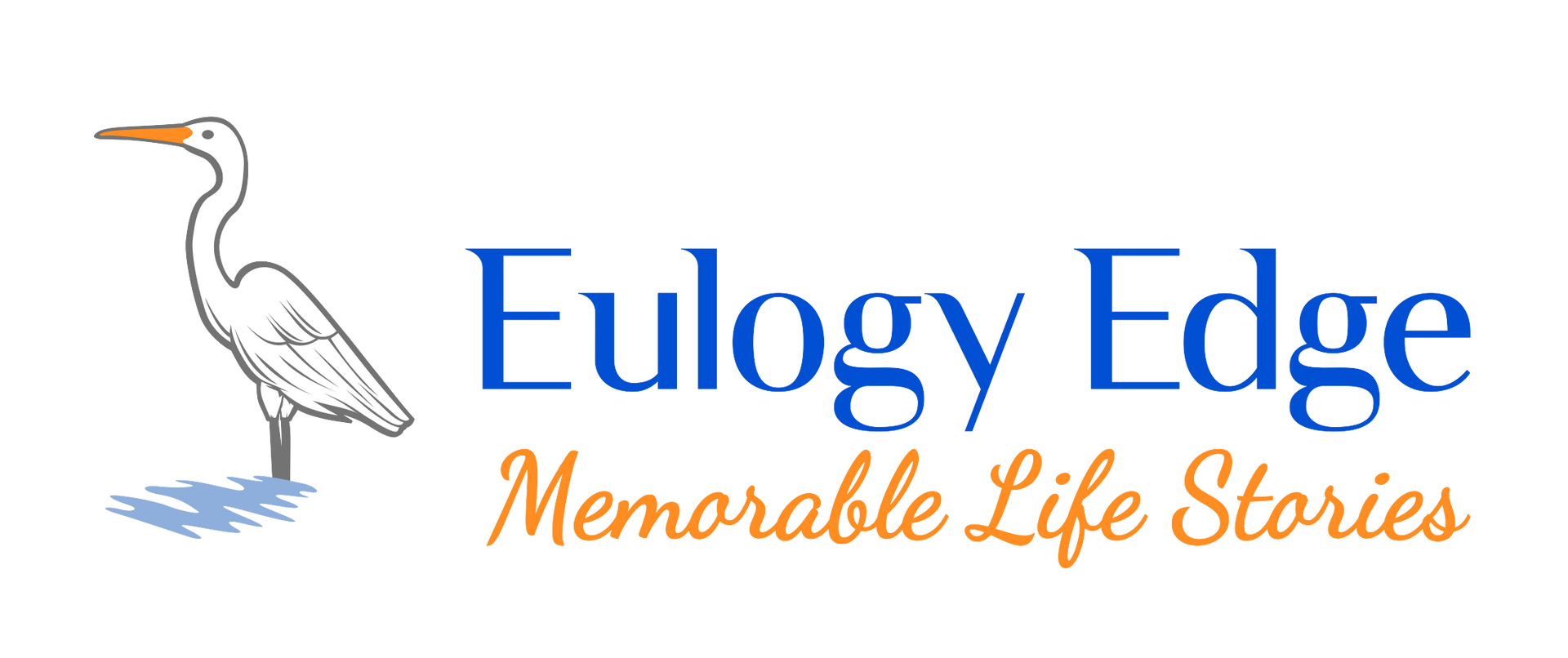Eulogies and Tributes
Contemporary Eulogies
A eulogy, or tribute, is a life story written to share and preserve our memories of someone who has died. It’s presented as a speech, usually at a funeral or memorial. These days, the best eulogies are fairly short (5-7 mins) and are written in your own, natural style. The aim is to be fairly honest, balanced and interesting, presenting in a storytelling style, rather than a formal speech that portrays a perfect person.
Everyone is different, so to do justice to the person who has died we take you through the process of writing and presenting a eulogy that is tailored to them, and their unique life story.
We understand that most relationships are complex and have their ups and downs. If you want to create a eulogy that respectfully includes many facets of their personality and life experiences, our Eulogy Guidebook will work for you. No matter how wonderful or difficult your relationship has been, we have strategies to get you inspired, keep you on track, tackle any difficult issues, and put together a memorable eulogy.
A eulogy is a celebration of a person's life, and in the process of creating one, you are likely to learn and appreciate many new things about them. A father is comprised of many facets - he may have been a husband, a colleague, an adventurous or romantic young man, a friend, an uncle, a grandfather, a boss, a club member, a sportsman, and so much more. In each of these roles, he would have showed different traits and skills. Writing a eulogy is an opportunity to look beyond the role you mostly saw them in, and unlock and celebrate all the aspects of the person they were.
If you want, or need, to give a eulogy and you're hesitating because it seems such a difficult task, remember that this opportunity to share your perspective won't come again. With the help of our step-by-step guidebook, you will be shown how to write and present a memorable eulogy. A eulogy, or tribute, is so much more meaningful when it's written and presented by someone close. Don't listen to other people's eulogies, or pass the task to a celebrant, and regret having your say.
Read: "How long should a eulogy be", next.
How Long Should a Eulogy Be?
The important thing to remember is that you want people to be interested and listen carefully to your eulogy. Also, there is usually limited time available.
Although you may be able to think of 10 stories to tell, or you could talk about the chronological events in their life for an hour, it's best to choose only the most important events in their life, and just a few stories that capture the main things you want people to know or remember about them.
Around five to seven minutes is a good timeframe to aim for. This may be around three pages, written or typed out. Practise reading it out-loud, fairly slowly, to check that you have the timing right.
In our eulogy guidebook, we give you detailed information on how to come up with, and how to choose the most important things to say, so you can fit it all into the 5-7 minute timeframe. And we show you how to prepare, practise and present your eulogy. Even if you have spoken to groups before, a eulogy can be a different matter due to the emotional nature of the event. Our guidance can help you keep it together and get your important message across.
Click the button below to buy our step-by-step guidebook.
Read: "Three requirements for a great eulogy", next.
Three Requirements for a Great Eulogy
The best eulogies, or tributes, leave an imprint on the heart of every listener. A eulogy that makes a memorable impact needs to be:
Expressive – To make a eulogy expressive, you need to create an emotional connection, and convey your unique perspective to the listeners. A good start is to be natural and use the words and style of speaking that you would normally use. Making an emotional connection could involve sharing your own feelings, and perhaps exposing some vulnerability in relation to the person who has died - for instance, you may talk about how they helped you become more confident after years of shyness.
Informative – Tell the listeners what the person was like, through the use of story-telling. If you simply list facts, it will be boring and the memories won’t stay with them. Instead of saying, "Barbara was always helping animals," tell the interesting and funny story of how Barbara once rescued a baby possum and how it used to hang on her earlobes and wouldn't let go. Telling a story well, is a skill that can be learnt.
Captivating – With the correct balance of facts and stories, an honest depiction of their character traits, and a portrayal of their life experiences and interactions with others, you can create a eulogy that is entertaining and engaging – a eulogy that will have people sitting on the edge of their seats and thanking you afterwards for the wonderful new memories.
Whatever your beliefs and whatever the complexities of your relationship, if you want to be stepped through the process of creating and presenting a great eulogy, including prompts, tips and examples of completed eulogies, click the button below.
Read: "What to include in a eulogy", next.
What To Include In a Eulogy
Read: "7 Steps to a Memorable Eulogy", next.
7 Steps to a Memorable Eulogy
A guidebook to help you write the best eulogy, when time is short and your head's in a mess.
When someone dies, time constraints, emotional strain, and all the other pressures surrounding you create an unavoidably stressful environment.
Whether you're good at writing or not, it's difficult to have a clear head when you sit down to write that eulogy which people will remember for years to come. Giving a eulogy is not a regular thing - it could be your first one, and you only have one opportunity to get it right, with no place for regrets. It's important that you don't leave anything out, and that your message is clear, concise and understood.
A great eulogy makes an impact on everyone who hears it, and imprints on them a new memory of that person which stays with them forever. If you want to write a eulogy that's individualised and meaningful, (not corny or a fill-in-the-gaps template), we'll take you step-by-step through the process of getting your own thoughts and feelings down, gathering information and stories, choosing the best ones, and creating and presenting a memorable eulogy that will have people coming up to thank you afterwards.
We've developed a unique and comprehensive process that covers everything from defining the message you want to put across, managing your own emotional state, how to include difficult issues, tips for story-telling, how to start and finish, different formats you can use, how to present your eulogy, and a lot more! Our guidebook contains hundreds of prompts and examples, and a structure that will keep you on track to make sure your message comes through in your own style, just the way you want it to. Our guidebook is suitable for use by teenagers and adults of all ages.
The last thing you need now is the added pressure of working out how to write a great eulogy. At around 70 pages long (A4 size), our professionally-written, step-by-step guidebook is comprehensive, covers a myriad of circumstances and is clear and easy to follow. We also include example eulogies for a father, a mother, and a sibling, in different styles.
Make your life easier, and finish with a great result!
As lack of time is often an issue when it comes to eulogies, on purchase, the eulogy guidebook is available for immediate download.

Great Things People Say About Us

“It showed me everything I needed for a proper eulogy – what to put in and leave out. The planning at the start helped me come up with ideas and lined everything up ...”
Jett W - age 20
"Very comprehensive and clear and flows well, covering everything you could think of!"
Angela R - age 62
“I'm so glad I took the leap to do this and my eulogy was so good! People were amazed ...”
Olivia S - age 36





